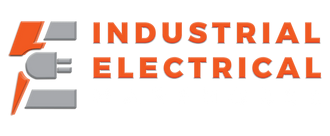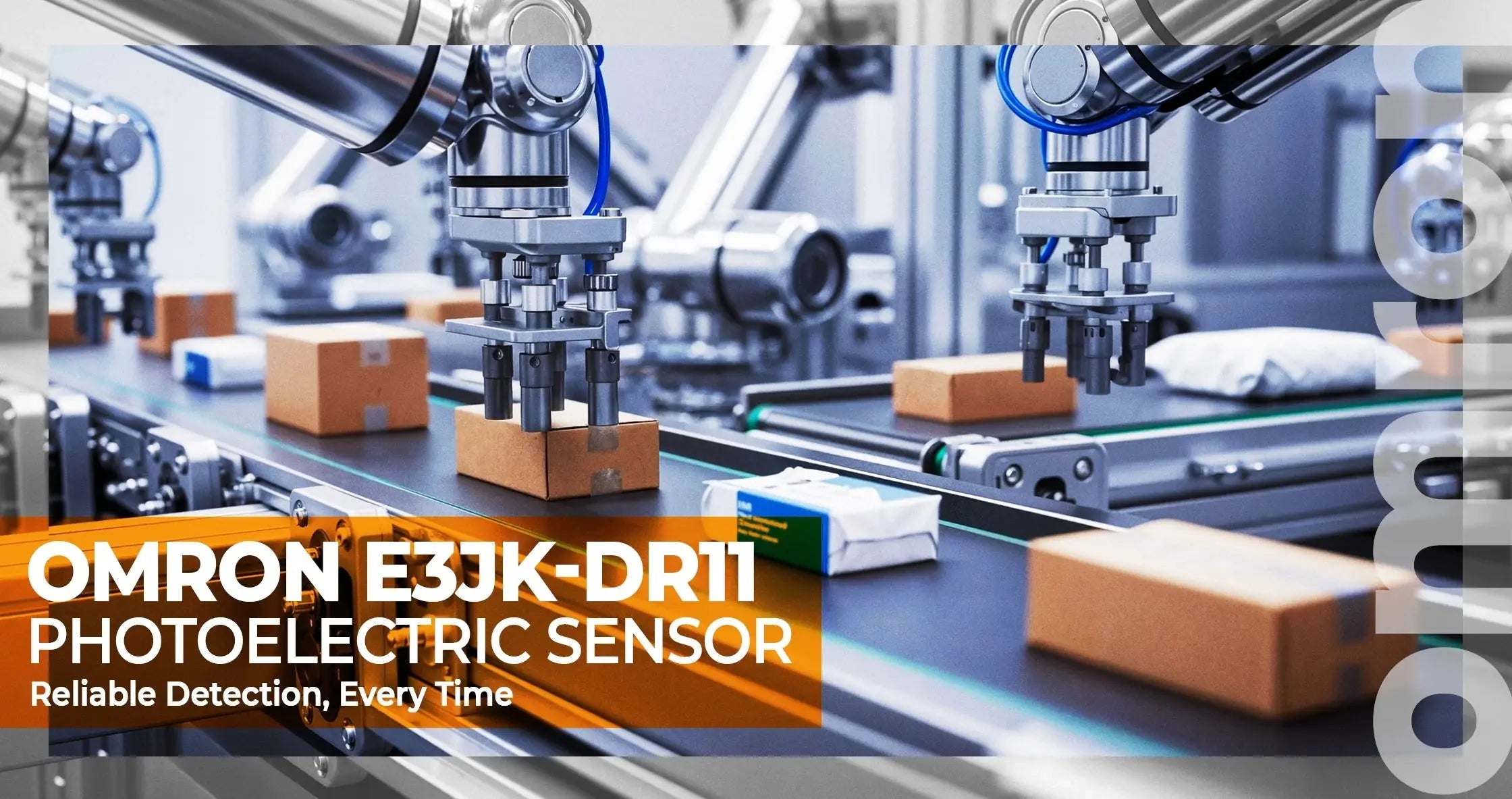The Omron E3JK-DR11 photoelectric sensor is one of Omron’s most dependable models for industrial object detection. It combines long-range diffuse-reflective type sensor technology, AC/DC compatibility, and a durable square-bodied design. This extensive guide will cover everything you need to know: from technical specifications, real-world applications, and installation best practices, to comparisons with alternative models, troubleshooting tips, and frequently asked questions. By the end, you will understand why this sensor has become a staple in automation projects worldwide.
What is the Omron E3JK-DR11 Photoelectric Sensor?
The Omron E3JK-DR11 photoelectric sensor belongs to Omron’s popular E3JK family of sensors. It is a diffuse-reflective type, meaning it detects objects by sensing light reflected directly from their surfaces. Unlike through-beam or retro-reflective types, it does not require a separate receiver or reflector, simplifying installation. The sensor uses a red LED light source that provides visible alignment and a sensing range of up to 2.5 meters when used with a standard white target.
This combination of long sensing distance, simple wiring, and rugged construction makes the Omron E3JK-DR11 photoelectric sensor a preferred choice in manufacturing, packaging, logistics, and many other industries.
Technical Specifications
To fully appreciate the capabilities of the Omron E3JK-DR11 photoelectric sensor, let’s break down its datasheet specifications:
● Sensing method: Diffuse-reflective
● Sensing distance: 2.5 m (with 300 × 300 mm white paper target)
● Light source: Red LED, 624 nm wavelength
● Power supply: 24–240 VAC ±10% or 24–240 VDC ±10%
● Power consumption: 2 W maximum
● Output: SPDT relay, 3 A @ 250 VAC; minimum 5 VDC, 10 mA
● Operating mode: Selectable Light-ON/Dark-ON mode
● Response time: 20 ms max
● Indicators: Orange output LED, Green stability LED
● Ambient light resistance: Up to 3,000 lx incandescent and 11,000 lx sunlight
● Operating temperature: –25°C to +55°C; storage –40°C to +70°C
● Housing: ABS resin with methacrylate lens
● Protection rating: IP64
● Connection: Pre-wired 2 m PVC cable
● Weight: Approximately 180 g with cable
Every detail of the Omron E3JK-DR11 photoelectric sensor is engineered for industrial reliability. The wide voltage range ensures compatibility across multiple power systems, while the SPDT relay output allows integration with both PLCs and legacy control circuits.
Advantages of the Omron E3JK-DR11
The Omron E3JK-DR11 photoelectric sensor provides several advantages over other detection solutions:
-
Flexible Power Compatibility – Works with both AC and DC supplies, making it versatile across different facilities.
-
Long Sensing Range – 2.5 m diffuse-reflective detection covers wider conveyors and larger equipment.
-
Visual Alignment – Red LED beam allows technicians to easily position the sensor.
-
Durable Build – IP64-rated enclosure protects against dust and water spray.
-
Selectable Modes – Light-ON or Dark-ON output can be chosen based on application needs.
-
Reduced Maintenance – No need for external reflectors or separate receivers.
By offering these benefits, the Omron E3JK-DR11 photoelectric sensor reduces downtime and maintenance costs while improving system reliability.
Application Use Cases
The versatility of the Omron E3JK-DR11 photoelectric sensor makes it suitable for a wide variety of industrial and commercial uses. Below are examples where it excels:
1. Conveyor and Packaging Systems
In packaging lines, the Omron E3JK-DR11 photoelectric sensor detects boxes, bottles, or bags moving on a conveyor. Its long-range capability ensures that even large items are detected without the need for reflectors.
2. Pallet Detection in Warehouses
Logistics facilities use this sensor to identify pallet positioning and detect overhanging loads. Accurate detection prevents accidents and ensures smooth material handling.
3. Elevator Safety and Access Control
The Omron E3JK-DR11 photoelectric sensor can be installed at elevator entrances or automated doors to detect obstructions, adding an additional layer of safety.
4. Industrial Machinery
In woodworking, textile, or food processing machinery, the sensor confirms the presence of raw materials. It prevents malfunctions caused by missing or misaligned components.
5. Level Detection in Filling Operations
The sensor can identify product levels in bins, cartons, or hoppers. While not as precise as ultrasonic sensors, it provides cost-effective level monitoring for many industries.
These use cases demonstrate the adaptability of the Omron E3JK-DR11 photoelectric sensor in diverse industrial scenarios.
Installation Guidelines
Correct installation ensures maximum performance from the Omron E3JK-DR11 photoelectric sensor. Below are key recommendations:
Mounting
● Use the E39-L40 bracket for stable mounting.
● Position the sensor squarely toward the target zone.
● Ensure the reflective area of the object is sufficient for 2.5 m detection.
Wiring
● Brown wire: Connect to positive DC or AC live.
● Blue wire: Connect to negative DC or AC neutral.
● Black/Gray wires: Relay output terminals for connecting the load.
● Ensure wiring matches control system polarity and relay configuration.
Adjustments
● Fine-tune sensitivity using the potentiometer.
● Confirm detection with the orange output LED.
● Ensure stable detection using the green indicator lamp.
Environmental Considerations
● Avoid strong direct sunlight aimed into the sensor.
● Keep lens surfaces clean for accurate detection.
● Verify operation within rated ambient light and temperature limits.
By following these guidelines, the Omron E3JK-DR11 photoelectric sensor can provide years of trouble-free operation.
Alternative Models in the E3JK Series
Omron’s E3JK family includes variations designed for different applications. If the Omron E3JK-DR11 photoelectric sensor does not fully meet your needs, consider these alternatives:
● E3JK-DR12: Infrared LED, short 0.3 m range, AC/DC relay output.
● E3JK-DR13: Red LED, 2.5 m range, optimized for different surface reflectivity.
● E3JK-DR14: Infrared LED, 0.3 m range, AC/DC relay.
● E3JK-DN11/DP11: NPN/PNP open-collector output versions, DC only.
● E3JK-TR11: Through-beam type, up to 40 m range.
● E3JK-RR11: Retro-reflective type, 7 m range with reflector.
Each variant maintains the same compact form factor, making them interchangeable in many setups.
Compatible Accessories
To simplify integration, Omron provides accessories for the E3JK-DR11 photoelectric sensor:
● E39-L40 Mounting Bracket: Ensures stable positioning.
● E3JK-DR11-C Variant: Includes mounting bracket in the package.
● Extension Cables and Conduits: For extended reach and protection.
● PLC and Relay Modules: Compatible with Omron’s control units for automation logic.
These accessories ensure reliable installation and connectivity in various system environments.
Troubleshooting and Maintenance
Even reliable devices like the Omron E3JK-DR11 photoelectric sensor may occasionally require adjustment. Below are common troubleshooting steps:
● No Output Signal: Check power supply wiring and confirm voltage within 24–240 VAC/DC range.
● Unstable Detection: Adjust sensitivity potentiometer and check for reflective interference from nearby surfaces.
● False Triggering: Clean lens surface and ensure strong ambient light is not interfering.
● Relay Issues: Verify load current does not exceed rated 3 A at 250 VAC.
Routine maintenance includes cleaning the lens periodically and checking bracket alignment. With proper care, the Omron E3JK-DR11 photoelectric sensor can last for years without failure.
Industry-Specific Applications
To better illustrate the impact of the Omron E3JK-DR11 photoelectric sensor, here are some industry-specific scenarios:
● Food and Beverage: Detecting cartons and bottles on filling lines.
● Automotive Manufacturing: Ensuring parts are present before robotic welding or assembly.
● Agriculture: Detecting pallets or produce bins on conveyors.
● Textile Industry: Monitoring rolls of fabric for breakage or misalignment.
Each industry benefits from the long sensing distance and durability of the Omron E3JK-DR11 photoelectric sensor.
Frequently Asked Questions (FAQs)
Q: Can the Omron E3JK-DR11 photoelectric sensor detect dark or transparent objects?
A: Yes, but range will be shorter than with reflective white targets. Sensitivity adjustment is recommended.
Q: Is the sensor suitable for outdoor use?
A: It is rated IP64 and can withstand sunlight up to 11,000 lx. For harsher conditions, additional shielding may be required.
Q: Can it replace older models like the E3JM series?
A: Yes, the Omron E3JK-DR11 photoelectric sensor is a modern replacement with longer sensing distance and better AC/DC compatibility.
Q: How often should I clean the sensor lens?
A: Maintenance schedules vary by environment, but cleaning every few weeks in dusty areas is advisable.
Conclusion: The Value of the Omron E3JK-DR11 Photoelectric Sensor
The Omron E3JK-DR11 photoelectric sensor combines long-range detection, easy installation, and durability, making it a versatile solution across industries. From packaging lines to warehouse automation, it ensures reliable object detection and seamless integration with modern control systems.
For engineers and integrators seeking dependable, cost-effective sensors, the Omron E3JK-DR11 photoelectric sensor is an excellent choice.
👉 Explore the Omron E3JK-DR11 photoelectric sensor to see how it can improve efficiency and reliability in your automation setup.
🔧 Related Product Collections
Photoelectric Sensors →
Explore a wide range of photoelectric sensors including diffuse, retro-reflective, and through-beam models for precise and reliable object detection.
Sensors & Accessories →
Find mounting brackets, reflectors, and wiring accessories to optimize the installation and performance of your photoelectric sensors.
IFM Electronic →
Browse high-quality IFM Electronic sensors and components as alternatives and complements to Omron’s product line for automation solutions.
This blog is part of our extended technical series on industrial automation products. Stay connected for more expert insights and product deep dives.


